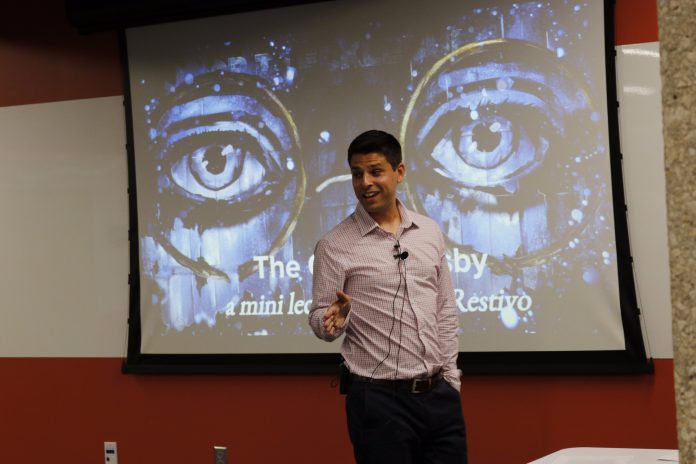
Kim Harms
News editor
The Great Books Series had their second presentation of the semester on Oct. 4 in the CoLab. Paul Restivo, adjunct english professor, discussed F. Scott Fitzgerald’s best-selling novel, “The Great Gatsby.”
Restivo, who also teaches high school english classes, said the novel is one of the most valuable books he teaches. The fascination with the lavish lifestyle presented throughout the novel is one of the many reasons why “The Great Gatsby” remains popular today.
“I think there is obviously the appeal to that type of lifestyle,” Restivo said. “Even today we are trying to live a Gatsby lifestyle or the New York lifestyle. This is one of the first times where that argument of whether the American dream is really attainable and whether we really understand what it is; that’s a timeless idea even today.”
Fitzgerald’s novel is filled with symbols and ideas which are still recognized in today’s society. Restivo discussed the different symbols and the various meanings interpreted by readers of the novel. T.J. Eckleburg’s billboard is one of the most common symbols found in the novel.
“That billboard, which is forgotten, nobody pays attention to it until closer to the end of the book,” Restivo said. “George Wilson thinks it’s speaking to him to go kill Gatsby. I think what offers some hope though, is that the billboard is never torn down and it remains; which means the pure Jefferson dream that we all have the right to life, liberty, and the pursuit of happiness can’t be torn down. That’s not something you can just erase.”
Towards the end of Restivo’s presentation, he discussed the ending of the novel when Nick Carraway is leaving Long Island and Gatsby is found at the bottom of a pool. Restivo said he liked how Fitzgerald left the ending more open because it shows the book can be about hope.
“There’s this awesome line at the end where Nick Carraway is leaving Long Island, but he looks back one more time and he imagines what the Dutch sailors saw when they first arrived; no city, no skyscrapers, nothing but green land,” Restivo said. “The possibilities at that point were endless. He compares that to how Gatsby must have felt about his dream…the possibilities are so great; what he didn’t realize is he was chasing something that was artificial.”
The novel is a staple in American high schools and english courses and Hollywood has made adaptions of the book into Academy Award winning movies. Restivo said he thinks the book will continue to be a staple in for years to come because Fitzgerald’s novel is relatable in the sense that everyone has dreams like Gatsby.
“I do think it will endure. I really think [Fitzgerald] wrote the great American novel,” Restivo said. “Some of the symbols in there are just screaming, ‘I’m a symbol.’ I don’t think it’s a book about race, a book about age, I think it’s a book about dreams and that’s why I think the story endures so much and it will because of that. I think the book shows we can still have pure dreams like Gatsby, but we can be corrupted too.”
The next Great Books Series presentation will be at 12 p.m. on Nov. 15 in the CoLab. Corbin Crable, coordinator, department of Journalism and Media Communications, will discuss “In Cold Blood.”





















